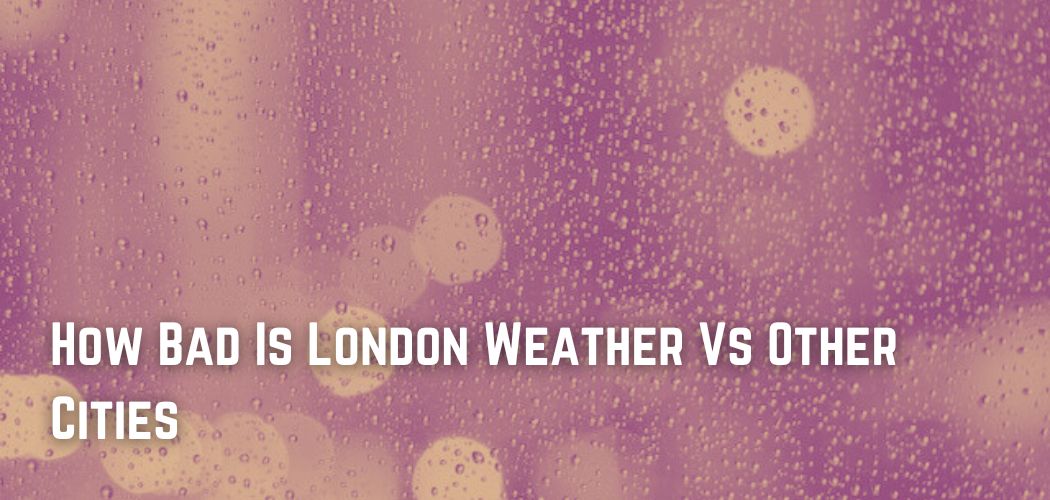The weather in London has always been a subject of fascination and discussion. Its reputation for gloomy skies, unpredictable showers, and chilly winds precedes it.
But how bad is London weather really?
In this article, we embark on a journey to uncover the truth about London’s weather patterns and compare them with other prominent cities across the United Kingdom.
By exploring factors such as rainfall, temperature range, sunshine hours, and extreme weather events, we aim to provide a comprehensive understanding of London’s climate and how it measures up to its counterparts.
Contents
- 1 How Does London’s Rainfall Compare To Manchester?
- 2 Does London’s Reputation For Fog And Mist Still Hold True? How Is It Compared To Edinburgh?
- 3 Is London prone to more extreme weather events compared to Birmingham?
- 4 How does London’s temperature range compare to Glasgow’s?
- 5 Are There Any Cities In The UK With Better Weather Conditions Than London?
- 6 In Terms Of Weather, Is London Considered To Be One Of The Least Favorable Cities In The UK?
How Does London’s Rainfall Compare To Manchester?
Rainfall is a defining characteristic of British weather. In this context, London is often perceived as drier compared to other UK cities.
However, when we compare London’s average annual rainfall of around 600-700mm with Manchester’s, we find a stark difference.
Manchester, renowned for its rainy reputation, receives an average of approximately 880mm of rainfall annually.
These figures suggest that London experiences less rainfall than Manchester, countering the notion that the capital is constantly soaked.
Does London’s Reputation For Fog And Mist Still Hold True? How Is It Compared To Edinburgh?
London’s historical association with fog and mist is deeply ingrained in popular culture. However, how does it fare in comparison to Edinburgh?
Edinburgh is often associated with its atmospheric haze. By examining the frequency of foggy and misty conditions, we can determine whether London’s reputation holds true.
Surprisingly, recent data suggests that Edinburgh experiences fog and mist more frequently than London.
Is London prone to more extreme weather events compared to Birmingham?
Birmingham, located in the heart of England, has experienced its fair share of extreme weather. However, London is comparatively less prone to severe events such as heavy snowfall and storms.

The capital benefits from its proximity to the milder coastal climate, resulting in a reduced frequency of extreme weather phenomena.
Nevertheless, it is essential to remain prepared for unexpected weather occurrences in any city.
How does London’s temperature range compare to Glasgow’s?
London’s southeastern location is often associated with a milder climate. However, compared to Glasgow, located in Scotland’s western region, London’s temperature range is relatively moderate.
Glasgow experiences cooler summers and colder winters due to its proximity to the Atlantic Ocean and the influence of the Gulf Stream.
In contrast, London’s temperatures remain more stable throughout the year. While both cities have their unique climate characteristics, London offers a relatively more temperate environment.
What About Sunshine Hours In London Compared To Swansea?
Swansea, located on the Welsh coastline, receives a higher number of sunshine hours compared to the capital.
London’s urban landscape and localized weather patterns contribute to its slightly lower sunshine duration.
However, it is important to note that London still enjoys a significant amount of sunshine throughout the year, providing ample opportunities to soak up the rays and indulge in outdoor pursuits.
Are There Any Cities In The UK With Better Weather Conditions Than London?
Yes, there are several cities in the UK that generally experience better weather conditions than London.
Here are a few examples:
- Edinburgh:
Located in Scotland, Edinburgh tends to have cooler temperatures than London throughout the year. However, it benefits from a relatively mild climate compared to other parts of Scotland.
Summers in Edinburgh are generally mild and can even see some warm, sunny days. Winters are colder, but the city is less prone to extreme weather conditions compared to London.
- Cardiff:
As the capital city of Wales, Cardiff enjoys a relatively mild and temperate climate. It experiences slightly milder winters and cooler summers compared to London. The city receives a moderate amount of rainfall throughout the year, but it is often less than what London receives.
- Plymouth:
Situated on the southwest coast of England, Plymouth benefits from its coastal location and the influence of the Gulf Stream.

As a result, it enjoys one of the mildest climates in the UK. Winters are generally mild with temperatures rarely dropping below freezing, while summers are pleasantly warm. Plymouth also receives less rainfall compared to London.
- Southampton:
Located on the south coast of England, Southampton experiences relatively mild and temperate weather conditions.
The city benefits from its coastal proximity, which helps to moderate temperature extremes. Summers are warm, and winters are milder compared to London. Southampton also receives slightly less rainfall than the capital.
- Brighton:
Another coastal city in southern England, Brighton enjoys a mild and relatively sunny climate. It experiences warmer summers and milder winters compared to London. The city is known for its vibrant beachfront and tends to receive slightly less rainfall than London.
In Terms Of Weather, Is London Considered To Be One Of The Least Favorable Cities In The UK?
In terms of weather, London is not typically considered one of the least favorite cities in the UK. While it does have its share of cloudy and rainy days, the weather in London can also be quite pleasant at times.
The city experiences a temperate maritime climate, characterized by mild winters and relatively warm summers.
London’s average temperatures range from around 2°C (36°F) in winter to 22°C (72°F) in summer. The city benefits from the warming effect of the Gulf Stream, which helps to moderate temperatures throughout the year.
However, it is worth noting that the city can also experience occasional heatwaves during the summer months, with temperatures sometimes exceeding 30°C (86°F).

In terms of rainfall, London receives an average of about 600-700 millimeters (24-28 inches) per year, which is relatively moderate compared to other parts of the UK.
While it is true that London can experience frequent overcast skies and occasional showers, there are also periods of sunshine and clear weather.
It’s important to remember that perceptions of favorable or unfavorable weather can vary among individuals.
Some people may prefer warmer climates with more sunshine, while others may enjoy milder temperatures and occasional rainfall. Ultimately, the subjective preferences and tolerance for different weather conditions will vary from person to person.

